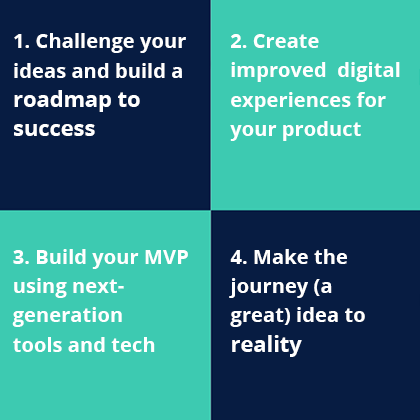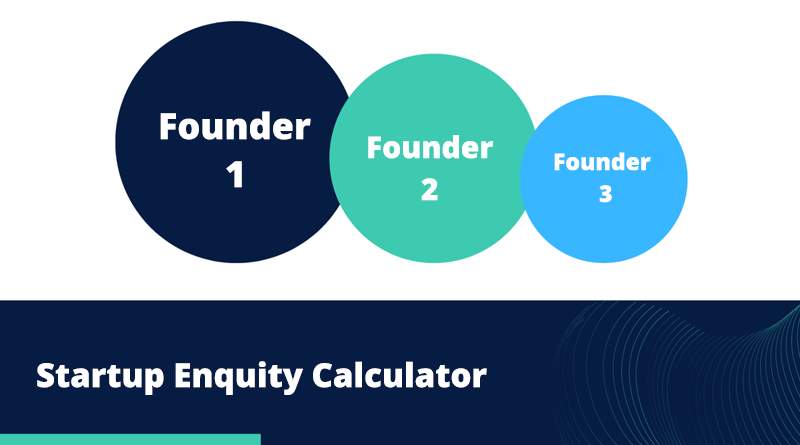
Startup Guide
Starting your own business can be an exciting venture. However, it can also be daunting if you don't know where to start or how to get things moving in the right direction. You might feel unsure about whether it's the right time to launch a venture of your own and what challenges you might face along the way. If this is the case, our guide is perfect for you!
Codeventure's Startup Guide will help you navigate the many facets of starting your own business, from identifying potential risks and opportunities to developing a strong entrepreneurial mindset and working through practical implementation strategies. Keep reading for insights on creating a successful startup, tips on finding funding, resources you need, different ways to build a team, and more.
4-Step Process in your Startup Journey
Your
Startup
Journey

There are so many startup ideas out there, and you may have a unique one. If so, it's crucial to think about how your idea could work. To do this, you'll need to challenge your idea and build a plan for success. Remember that you are not 'building' a product but 'solving' a problem.
One way to do this is by creating a road map of how you plan to get from point A to point B. This will help you stay on track and keep your Startup on target. Point A will begin with ideation, where you are looking at why you are building your Startup, what issues it intends to solve and who it will cater to. You can do thorough market research and even start talking to potential customers about why existing products don't meet their demands or check if your innovative idea is something they would actively prefer over alternatives. Phase 1 of your roadmap can end with launching the Minimum Viable Product (MVP).
Once you have the plan all jotted down, you can start developing your product or service.
For example, if you're creating an app that helps people find parking spaces, consider the features it needs before building the App. You also need to understand who will use the App and where it will likely have the most demand. People often only need one parking app, so check whether established competition exists. Once you iron out all the necessary details, it's time to start taking action and see if you can make it happen.
Creating digital experiences for your startup product is a crucial part of the business. Digital experiences can be used to engage with customers and potential future customers, as well as to promote your product.
Digital experiences should be friendly, intuitive, and beautiful. They should also be consistent with your brand. It can take time to develop digital experiences that fit all the bills but never rush through it.
Start by thinking about how you want people to interact with your product, what features they should be able to use, and how you want the user experience to look and feel. Once you have an idea of what you want, start creating wireframes.
Wireframes are low-fidelity sketches showing how the user interface looks and functions. Once you have a basic wireframe, you can move on to prototyping, which is creating a visual representation of how the product will look and function using HTML, CSS and JavaScript.
Then, once it's ready, you can move on to development!
The next step of your Startup Journey is to create a Minimum Viable Product (MVP). Your product should be future-proof, so always keep in mind to use best-in-class technology and practices during development. Always understand that you are addressing a present problem for future people, so your MVP must be flexible enough to grow with your users.
One of the most important things you must do to ensure this is to build a product that meets your customers' needs. You can achieve this by researching what your customers want and listening to what they say. By making a product that meets customers' needs, you will be able to create a sustainable business model.
Another thing that you must do is build a product that is easy to use. The initial designing part should take care of this aspect to an extent, but it is vital to execute what was set on paper. People are more likely to use your platform and buy from it if they have a good browsing experience.
And last but not least, you must build a great brand. If you build a great brand surrounding your product or platform, people will be willing to pay for it because they value your company's name and offering.
Codevenuture's Startup Resources: For Website Traffic and Funding

Whether your Startup is a new business venture, a franchise, or an innovative idea from a science lab, you should always be in pursuit of profit. However, before making a profit, you need to raise funds and get enough people to use what you are selling.
Many resources are available online to help you get off the ground, including business incubators and accelerators, mentorship programs, coworking spaces, and specialized training.
If you are from a non-technical background, platforms such as Codeventures can even help you build your Startup (as a technical cofounder) in return for small equity.
You can also find advice and expertise from experts in your industry through Entrepreneurial meetups and professional social networks. You can also find funding opportunities, such as angel and venture capital funding or crowdfunding from such places.
Finally, you can leverage the momentum of successful companies by studying their success stories and looking for inspiration.
Here are some of our premium Startup resources that you can use for free today:
Building a startup is one of the most exciting things you can do with your life. It means you're taking control of your own destiny and making something that others value.
There's no right or wrong way to start a startup as long as you're passionate about what you're building. But it is important to be realistic when setting goals and to avoid getting ahead of yourself.
With a proper MVP, you've already laid the foundation for your Startup. Now it's time to attract early adopters, increase your footfall, get better funding and get expert advice. Always be ready to pivot if necessary. The goal of building an MVP is to find the product market fit.
The Journey from idea to reality occurs when you have enough users and funds to achieve a confident final product. You can start hiring people and additional executives to help you with development. You can start investing in additional infrastructure and resources. Finally, remember that not everything will go as planned but it is important to keep the focus on your vision.
Codevenutes Startup Resource: For Hiring Employees with Startup Equity
Startup Equity Calculator helps you determine the equity value of your Startup and what the breakdown of that equity is between each founder. You can then use that information to help with any negotiations later on when you are trying to decide what percentage of equity each founder should get. You can use this while hiring new people for equity, especially during the growth stage.
It's worth noting that this isn't always an accurate way to figure out how much equity each founder should have because there are other variables like dilution that could have a big impact on the final amount. However, it's still a good starting point for making sure you have a clear understanding of how much equity each founder gets and what their individual shares are worth.

Are you looking for a Technical co-founder for your Startup? Apply today
